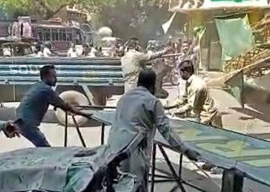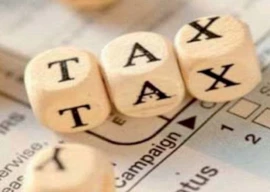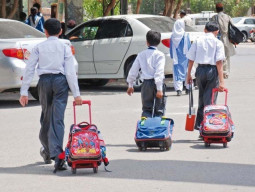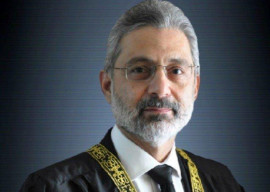
During the presidency of Ayub Khan, life was peaceful and predictable. Motorists weren’t relieved of their wallets at traffic signals and there were no suicide bombers or terrorists blowing up public transport. Worshippers went to their mosques, temples, churches and gurdwaras in the knowledge that they would come out alive. I believe there was also a synagogue where a clutch of local Jews prayed to Yahweh. A healthy respect for one another’s religion was the order of the day. People were civilised. There was decency everywhere. Eid was indeed a joyous occasion.
The happiest Eids, however, were the ones I spent during the war years in boarding school in Panchgani, a tiny hill station tucked away in the western ghats of India. As far as I can remember, the Eids always seemed to occur during the rainy season which lasted from the beginning of June to the end of September. We never could spot the Shawwal moon during the monsoon because at the precise time the heavy clouds that had repeatedly ploughed some northern mountain, stubbornly blotted out the sky. We came to know about the sighting of the moon by telegram from some place in the UP or the Deccan where a Muslim cleric had spotted the thinnest of crescents.
The majority of the students in St Peter’s were Christian and either English, Australian or Anglo-Indian. There were 10 Muslim students, 12 Hindus and seven Jews, six of whom came from Basra in Iraq, while the seventh was an Ashkenazi from the US. We all got on like a house on fire. It was camaraderie at its best. There was no Hindu-Muslim tension or rivalry in the school. We never knew to which Muslim sect the maulvi who led the Eid prayers belonged. He was a Muslim and that was enough for us.
The principal of St Peter’s was a protestant missionary by the name of Rev FM Mckeown. He was a devout Christian, an upright, strict disciplinarian who smoked a pipe, went for long walks in the evenings and, after dinner, listened to Brahms. The teachers were terrified of him. On occasion, he became quite unreasonable, like the time a delegation of Muslim students led by Talal Asad, son of Muhammad Asad, author of Islam at the Crossroads and The Road from Mecca called on him to give Muslim students permission to fast during the holy month. It looked as if the principal would break into an apoplectic fit. “The next thing we know,” he said with a scowl on his face as he tamped aromatic tobacco into the bowl of his briar, “the boys from Basra will want to celebrate Yom Kippur and the Passover and the Hindus will want to throw coloured water on each other.”
But Talal was tenacious and obstinate and wouldn’t budge. Sir Richard had met his match in Saladin. At first Rev Mckeown was unyielding, but the thought of 12 young lunatics going on a hunger strike and The Times of India getting hold of the story must have flashed through his mind. After all, Indians went on hunger strikes at the drop of a hat. Eventually, a compromise was reached. Sehri would be served. But instead of iftar, which would create logistic problems for the staff, the devout would be served a double helping at dinner. That was the best Eid I ever had.
Published in The Express Tribune, August 31st, 2011.
COMMENTS (31)
Comments are moderated and generally will be posted if they are on-topic and not abusive.
For more information, please see our Comments FAQ










































@Arindom: The People of Jammu, Ladakh and Kargil are not 'Kashmiris'. These ethnic groups and the Kashmiris from the valley are bound together by a common history. But, to call them Kashmiris is disingenuous.
And this is as good an article as you would get to read on Eid day. Well done. Everyone who've lived in British India has only praise for it. Then who divided it?
@ Bruite force i think thats why Allama iqbal said it about this if this is freedom then we were better off in British raj occupation time is not it bruite u know what i mean our demand of country was right.
@v: Dear V I was delighted by your comments. Do send me your email address so we can correspond. A.M.
@ my name khan We heard these emotional speeches many time before even Maulana Azad also regred not to leave pakistan in his final days please go to india i bet you will be in Dehli jail with some chisti sahab praying and giving speech to india kala polica wala.
the state of religion and society in Pakistan can now be compared with the Spanish Inquisition.
@mind control:
Wow, another brainwashed bufoon, courtesy of SAFMA. Heck, if USSR was present, these people would have declared Quaid-e-Azam wanted Pakistan to be a communist state! :D
Sir,
We can also look at it this way. In the first 20 odd years of its existence, Pakistan was still imbued by the ethos of undivided India. 1969 onwards the votaries of Nazaria-e-Pakistan and those who had cut their teeth on this nazaria came into prominence. Rest as they say is history.
Beautiful article. I love your subtle lead-up to the Talal Asad story.
Eid was a time of charity, of giving and sharing with those around you but less fortunate. I would say a different time, different people with a different mindset. Women more visible without the misgonyist reaction they now provoke.
The idea of Pakistan was definately a very tolerant one. Up to the mid sixties violence of the kind that is a daily routine was unthinkable. There were two elections held, although designed to ensure the continuity of Ayub Khan's rule thru the basic democracy system, but these were without the kind of violence which is expected and one reads about during today's electoral process. At the end of the day lives lost are just numbers. As a result of ongoing communal rioting in India, in reaction there would be peaceful demonstrations, very voluble yes, but no destruction of property or any weaponry ever in sight.
too much blood has been shed----and continues to be shed in war and suicidal acts. It is high time that all of us remember that all humans are ONE FAMILY. The great sages of all times and all climes have taught us "THE GOLDEN RULE" Yet we only cherish the metal GOLD and we continue to ignore the universal teachings. ALAS-----
@Anwer Mooraj
Regards, sir. Very humane,soothing post.Thanks a lot. Wish you share more of your experience of living in those days gone by.
@Ali Tanoli,:
yeah - Pakistan is a really free country - free for anyone to train, arm and send terrorists all around the globe.
@Arzoo: I never tire of reminding anyone talking about Kashmir as a monolithic muslim group that it also includes Buddhist-majority Ladakh and Hindu-majority Jammu who are as "Kashmiri" as anyone else in the State.
@Arzoo
I have noticed that not only Pakistani's but many muslims around the world once they become sizeable in any land have an overpowering urge to kick out or undermine the liberties of people of other religions....this wont last for long now... and if you continue this attitude very soon people will be kicking out Muslims and Islamists from their land very soon, brievik is just a trailer....
Another thing I have noticed about Pakistanis, you think that Kashmir is yours just because it has a muslim majority? Well then you are in for a shock if you get to know what Hindus think about Kashmir , Pakistan and every inch of land from Bamiyan to Angkor Wat...:)
@Arzoo:
Yes. You are right.
Pakistan needs to learn from its own mistakes. But, with each passing day it makes you think if it has crossed some invisible threshold after which it cant turn back for the better.
India, on the other hand, has been doing well in all areas, mostly, except in Kashmir.
But, I have observed a sea change in the way the Government of today behaved than, say, in the 1990s. They dont stop any one in Kashmir meeting anyone else(Khar meeting the Seperatists last month) and allowing the people to exercise their right to opine and vote, as happened in the recent panchayat level elections, participated by a overwhelming 80% of the people.
Lot of bad things have happened. I agree. Indian Constitution will make sure every citizen of India will get his right.
@Ali Tanoli,:
I dont know about freedom of speech but all Muslims can practice their faith freely and without fear, no matter if they are Ahmadi or not.
@Ali Tanoli,: you are kidding.. right? I know freedom of speech appears only on paper in India, but to think pakistan gives better rights to their ppl is absurd.. go read your laws about blaspehmy and other religious related matters
Pakistan has many problems but it is true free country in term of speech is india also??
@ Bruite forcee INdian muslims so happy and so free in democracy but i dont see any comment here in this paper is there any freedom of speech in india ???????
@Arzoo I want to believe your version of partition but it is hard to rationalise. First muslim league was not really representative of all muslims of India as it was claiming. Second the kind of protection muslim league was trying to get was absurd. The Bangladesh issue was totally different where west pakistan didn't let Mujib form the government despite their electoral victory.
people who read need to think and discuss these ideas ----often we humans--as JK Galbraith remarked--and fogive me for paraphrasing JKB------persons do not want to consider any other way of evaluating their fixed belief system----they immediately set about defending it------it really is threatening to think outside the box. Takes COURAGE
Dear Anwer Sahab,
Panchgani is still a very beautiful place and the monsoons only increase its beauty. I live just about 2 hours away from Panchgani and thats the first place I go to whenever I have a little free time or a long weekend. The lovely strawberries, raspberries, and mulberries still grow in abundance. If you can, you should try and visit it once more to re-live your childhood memories :)
Regards, V
and even the sermons on Friday and Eid prayers focused on enlightening people on real issues related to their daily lives. Beginning of the eighties, I used to love going to the mosque to pray. The tranquility was just intoxicating. By the end of the decade, streets were patrolled by tablighis dragging (err.. inviting) people out of their houses to go and pray in mosques. I have seen grown men hide in their houses from them. It was only a matter of time that considerate and learned maulvis were replaced by fire-spitting clerics who could'nt go beyond the verbatim translation of Quran let alone its logical interpretation and meaningful education. The only mission in their eyes was to create hatred for anyone who did not subscribe to their views. I dont have enough fingers to count the splits in our society, even the categories of splits like religion, sect, domicile, ethnicity, etc. Would it be as easy to teach people to love humanity as it was to make them hate it.
@BruteForce: I do not know which side of the border you come from, but regardless you are correct to a great extent that India was a pluralistic society much before the partition. However one thin\g remarkably common between the two neighbors is the intransigence and lack of ability to tackle difficult issues. Muslims, being more than a significant minority, were seeking constitutional assurances of protection as a distinct group prior to Independence. Congress, including Gandhiji, acknowledged the demands of the Muslim groups but wanted to deal with it after Independence in a democratic set-up. Muslims viewed this with suspicion and felt, rightly or wrongly, and I tend to believe wrongly, that they will be railroaded once the nation gains independence. This viewpoint should have been reconciled but for the instransigent attitude that I earlier referred to. (Maulana Azad has stated this viewpoint more eloquently in his book: "India Wins Freedom.)
This is the same mistake we Pakistanis made with the majority portion of our nation. Bengalis had raised very legitimate issues but we were treating East Pakistan as a colony instead of equal partners and it resulted in the breakup of the country. India is displaying the same intransigent attitude in Kashmir. I, for one, would like to see Kashmir remain part of India for many reasons, if the Kashmiri population would find it in their hearts to accept it. But forcing your pluralistic society down the throats of an unwilling population will only work in tragic consequences.
You went to school with Talal Asad!
when ayub khan realised that no one had read field marshal auchinleck's recommendation to retire him @ rank of Colonel and Jinnah's caution "not to promote Ayub beyond rank of Brigadier" could be circumvented----he used one political agent major-grneral Iskander Mirza as his point man. In Egypt G.Abdel Nasser similarly used an army man col. Neguib to clear his path to top position. After Ayub replaced the commander of his Kashmir attack@ a critical bridge @AKHNUR-----the new commander did not advance beyond this point- this man Yahya was a debauch and lost E.Pakistan . The rest is history.
It reflects how plural India was since a long time, especially even before the Partition. These kind of stories is a slap in the face for those who said Hindus and Muslims cannot get along and advocate the 2 nation theory.
India's plural culture got a severe dent when the 2 nation theory was proposed. That hurt that Muslims of India, those who stayed back as well as those who went to Pakistan. Pakistan turned out, well, you all know. In India however the relations between Hindus and Muslims were damaged. Things have improved but a lot has to improve in India.
Wow! it's an eye-opener for me!
Thank you Anwer Mooraj Sahib for a trip down the memory lane. And what a beautiful lane that was. About which Moulvi led the prayer was inconsequential is something I happened to witness too in the Pakistan of 1960s. At Friday prayers' time I used to drag a classmate, who happened to be a Shia, to the Sunni mosque with me and there were times when, if we were passing by an Imambarah (which is what we called them then, not Imambargahs) we would just go in to offer our prayers. There really was no thought in our mind of the differences of these sects. Not only that, we never gave a thought about who was an Ahmedi or who was not. Your article made me nostalgic with a sweet ache in my heart for the beautiful years I spent in Karachi of those years. And I also feel sorry for the younger generation of this beautiful city of what they really missed. May I also relate something that will shock many people. When I arrived in the U.S.A in late 1960s right after my high school graduation, I really wondered what a barbaric place I had come to, in comparison to my native city of Karachi. Now do not misunderstand me, America was not that bad, but compared to Karachi some of US cities at that time had crimes that were unthinkable for us. C'es la vie.
@ Author - great article. Sadly, most of our ultraconservative brainwashed compatriots will not understand the value of communal harmony. They are raised as children of Zia taught that only the Salafi-Wahabi way must succeed.
Sadly, the very harmony you talk about exists not in our homeland, but our bitter "enemy" India. If we could grow up, open our eyes, and remember that Pakistan was once a great country made to defend minorities rather than to destroy and hate them, we might once again have some pride. Until then, we'll follow false idols like lemmings whether those be the flavor of the month - Z Mirza or the fool of the year - Imran Khan or a regular demagougue like Zaid Hamid. Hate is all those guys know.
One reason life is so messed up in Pakistan now a days is the huge, and ever increasing, population. Crowded cities, with uneducated, and semi-literate and burgers ( mummy-dady types) lead to uncivilized behavior.
Thanks.